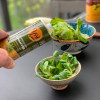It is worth noticing that our eating habits contribute to "specialize" our intestinal flora. Thus, the instestinal flora of a vegetarian will not be the same as the one of a omnivore.
A poor digestion for whatever reasons can cause nutritional deficiencies, even if, beforehand, the diet is healthy, balanced and qualitatively and quantitatively appropriate to the need of someone in particular.
Sometimes, we see symptoms such as hair loss, deep demineralizations with their share of symptoms, weight loss, diarrhea, constipation.
All of this is often only the illustration of mistakes concerning the digestive physiology.
These symptoms are often misinterpreted as presumed detox attacks. In reality, it often illustrates intestinal flora disorders - dysbiosis and inflammatory state of the digestive mucous membrane - with their share of consequences (pains or symptoms) on the body.
It is sometimes also the expression of an imbalance in the diet (lack of something or excess of that).
Chronically laborious digestions (bloating, heartburn, gastric reflux, gas, etc.) can be at the cause of a permanent intoxication of the body following significant fermentations and intestinal putrefactions.
Vegetarians, vegans or raw-foodists are sometimes real "walking gasworks". In fact, it is possible to make large amounts of alcohol in our body and suffer from cirrhosis of the liver without drinking a single drop of alcohol on a daily basis.
On the other hand, chronic digestive disorders are also the cause of a toxilymphemia (blood and lymph intoxication) by alteration of the bolus and imbalance of the intestinal flora. This situation may be at the origin of elimination illnesses such as acne, eczema, etc.
Intoxication of the body can in turn generate the acidification of the body and cause all kinds of disorders in the future. To avoid the different symptoms combined with laborious digestion, we just have to observe the digestive physiology:
- compatible and incompatible food combinations by avoiding the consumption of watery acidic fruit such as citrus fruit (orange, lemon, grapefruit, mandarin, etc.) but also all watery semi-acidic fruit such as apple, pear, cherry, apricot, etc. for a meal where carbohydrates or cereals have been consumed, as this will hinder their digestion and cause gas and bloating.
- do not drink large quantities of water during a meal at the risk of diluting too much the digestive sugars and hindering the digestive process.
- do not drink fruit juices, syrups, sodas during a meal.
- leave 4 hours minimum after a meal before eating anything else, even a piece of chocolate or a cookie.
- leave 2 hours after a meal before drinking even water, except in the case of an urgent and intense thirst. In this exceptional case, we will only drink a little water, sip by sip.
- some people will tend to consume too many cereals or carbs or starch, or to snack these foods all the time, which can lead to hemogliase (thick blood) as well as excess weight or obesity. It can also stimulate the very high production of saturated fatty acids whence atherosclerosis. These excess of food can also acidify the body.
All you have to do is to control and reduce the consumption of these foods.
Here we can specify that it is advisable to combine carbohydrates with proteins during the same meal, although some people say that this is an incompatible food combination.
The proteins intake will help promote the feeling of satiety.
Moreover the presence of sugar contributes to a better assimilation of amino acids from animal proteins, especially.
Different people will consume too much oleaginous fruit in order to ensure their need for amino acids..., which can be the cause of liver exhaustion (bad breath, discolored stools, yellow complexion, nausea, loss of appetite...).
- excessive consumption of carbs or cereals, combined with legumes, promotes digestive disorders. This excess affects particularly those who, through this practice, hope to ensure a good intake of all essential amino acids.
- some followers of the macrobiotic diet may affect their health in some cases. The macrobiotic diet focuses mainly on whole cereals, unprocessed fruit and vegetables. There are different "adaptations" of this diet.
Thus, some followers of the macrobiotic diet consume 70% of cereals and 30% of vegetables with a large intake of fried foods sometimes. This practice is harmful for the liver.
It is necessary to reduce the consumption of cereals and to increase the consumption of cooked and raw vegetables, while reducing the consumption of fried foods.
- you can sometimes meet people who consume too much watery fruit (nutrients + water + acids, such as citrus, apples, pears, cherries, apricots, etc.). In this case, we notice a loss of vitality, weight, sexuality, but also anemia, a dryness of the skin and its premature aging, a deep demineralization of the body, etc.
In some cases, it is not the vegan or raw diet, which should be questioned in absolute value but the way it is lived with unwise practices. For example, some consume large amounts of citrus every day or drink a litre or more of these fruits daily.
It is relevant to reduce the consumption of watery acidic and semi-acidic fruit by adapting it to our personal capacity to oxidize these foods. Thin and sub-vital people (sensitive to cold, heat and effort) would benefit from consuming few watery acidic or semi acidic fruit.
Among the different diets mentioned in this article, some people who follow them, do not consume enough oil or vegetable oil. Indeed, some vegans (but not all) consider that nuts, hazelnuts, etc. do not constitute the natural diet of man and therefore do not consume them or very little.
Moreover some of them do not consume oil in bottles, because they consider it to be against nature since it has required man’s intervention to obtain the processed product.
A lack of important fatty acid such as omega 3 or 6, will have many consequences: cognitive disorders, mood, memory, cardiovascular problems, etc.
By consuming, at each meal, a tablespoon of oil rich in omega 3 or 6 (hemp, flax seed) of first cold pressing and of organic origin, among other things, will make it possible to counter these deficiencies.
Even if the plant kingdom is rich in proteins, differentvegetarians, vegans or raw-foodists can be deprived in amino acids due to a digestive inability to extract them from plants.
Some vegetarians, vegans or raw-foodists (but not all) say they are constantly hungry during the day, although they feel like eating a good amount of crudités, but also carbohydrates in the form of bananas or potatoes, for example.
When fullness is not attained on a regular basis, it corresponds to a “deficit” at the blood or intracellular level.
This deficit may concern glucose, amino acids or other molecules that the body needs.
This deficiency can result from an inability for the body to properly digest the bolus due to digestive disorders or an imbalance in the intestinal flora, or a deficiency in digestive enzymes.
In other cases, this can be the result of reaction hypoglycemia, due to insulin resistance or excessive consumption of high glycemic index sugars that cause a sudden rise of glucose in the blood. The latter will inevitably be followed by a hypoglycemia called “reaction” and the desire to eat again.
The solution is to reduce one's consumption of plants at least temporarily and to carry out an "individualized dietary adjustment" with the possible help of a health professional, in order to eliminate all the causes that can promote imperfect digestion and, on the contrary, increase its digestive capacity.
Vitamin deficiency of animal or plant origin, for various reasons.
D vitamin is a liposoluble vitamin (soluble in fats or lipids). In humans, D vitamin is formed from a derivative of cholesterol under the action of UVB radiation from the sun (D-cholecalciferol) and also following the absorption of D vitamin precursor foods, that the liver and the kidneys help transform it into active D vitamin (D-ergocalciferol).
With age (more or less from the age of 65 years old), nutritional deficiency, various food but also atmospheric pollutants, the use of sunscreen, etc., the synthesis of D vitamin by the body gradually decreases.
D vitamin is the subject of very important scientific research.
Beyond its notorious function against decalcification and rickets, we learn that D vitamin, when it is present in sufficient quantity in the blood, contributes to less cancers, heart attacks, fractures, joint pain, infections, depressions, or even dementia, etc. (see the book: "Vitamine D, mode d’emploi" of de Brigitte Houssin, Thierry Souccar ed.)
D vitamin supplementation is relevant during the cold periods of October to May, in the northern hemisphere. Preferably choose a D vitamin from the lichen for its D3 vitamin intake and not sheep tallow, which is often loaded with toxic substances absorbed by sheep such as phytosanitary products.
...............................................................................................................
Eric Darche is Hygienist-Naturopath, author, lecturer.
Founder of an online school of Naturopathy and Hygienism: ENHED
Groupe Facebook group open to all where you can find him:






